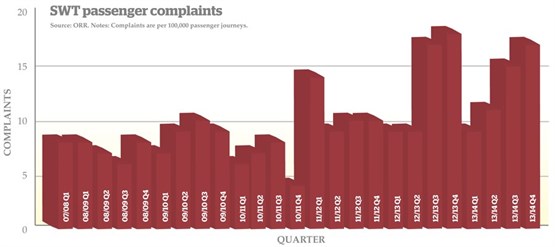Now he leans forward across the table: “I have to tell you this is a bit of a game, because what I really want is the high-output train to do the third rail.”
This, he argues, will be a game-changer. But it’s not without challenges. Third rail sleepers are longer than normal, because they need to carry that extra rail. Then there are all the hefty cables that link sections of conductor rail. And impedance bonds. All must be removed before track renewal work and replaced afterwards.
The Alliance has spent £200,000 modifying the train to cope with longer sleepers. But it acknowledges there are still problems with all the track cables and this has still to be worked on.
“Somebody has to come in and take them off and then put them back before trains can run again. Unless we coast,that is, which I’m still working on,” says Shoveller. That’s an interesting possibility. It’s been done by Virgin with 25kV OLE, but never on the third rail.
So, the result? “In week 29 we’re going to do the first high-output track renewal with third rail as an experiment near Shawford. And once we’ve done that, later on this year we’re going to replace five miles of track in each direction at Wool, which is from the 1950s, it’s life-expired, and it has a speed restriction on it. We’re going to replace it efficiently overnight, using the machine.
“That’s a really, really big step, because once we can do that I can get to grips with some of the backlog of renewals at places like Woking and the main lines to Basingstoke, where a lot of the track was relaid in the mid-1960s for Bournemouth electrification and now needs to be done again - both track and the ballast.
“This allows us to do it in an efficient way. Because, frankly, closing the railway for 27 hours and doing a couple of hundred yards on a Sunday with JCBs is crap, isn’t it? This has to be done overnight and until we have the high-output train we can’t do it overnight. This at last gives us that opportunity.”
Reducing delays
Shoveller shifts to a different topic… delays. More precisely,
‘sub-threshold’ delays. He reckons it is the most important thing he’s learned since heading the Alliance and it’s something he feels that is important across the whole railway industry.
He ropes Finance Director Andy West into the story: “Andy’s been finance director since SWT was created, and he was here under British Rail. He desegregated Network SouthEast and has just put it back together again financially. He’s learned things about this business he didn’t know. He never knew that about 60%-70% of all our delay is never recorded because it’s sub-threshold. It’s below the contractual regime. He didn’t know that.
“For all these years people have been talking about business cases that was just about delays generated of three minutes or above. Well, the vast majority of the delay that we have never actually generates a Schedule 8 financial issue. And yet how often do you hear the regulator talking about sub-threshold delays? How often do TOCs and NR talk about sub-threshold delay?”
Shoveller reacts sharply to a suggestion that these delays might not matter: “My God! They matter more than anything else! In some respects they’re more important than the threshold delays, because if we have 7,000 minutes of sub-threshold delays, and let’s say I’ve got 2,000 minutes of recorded delay that we analyse to death and argue about whether it’s a Network Rail delay or an SWT delay, below we still have 7,000 minutes of delay that I don’t know who it belongs to!












